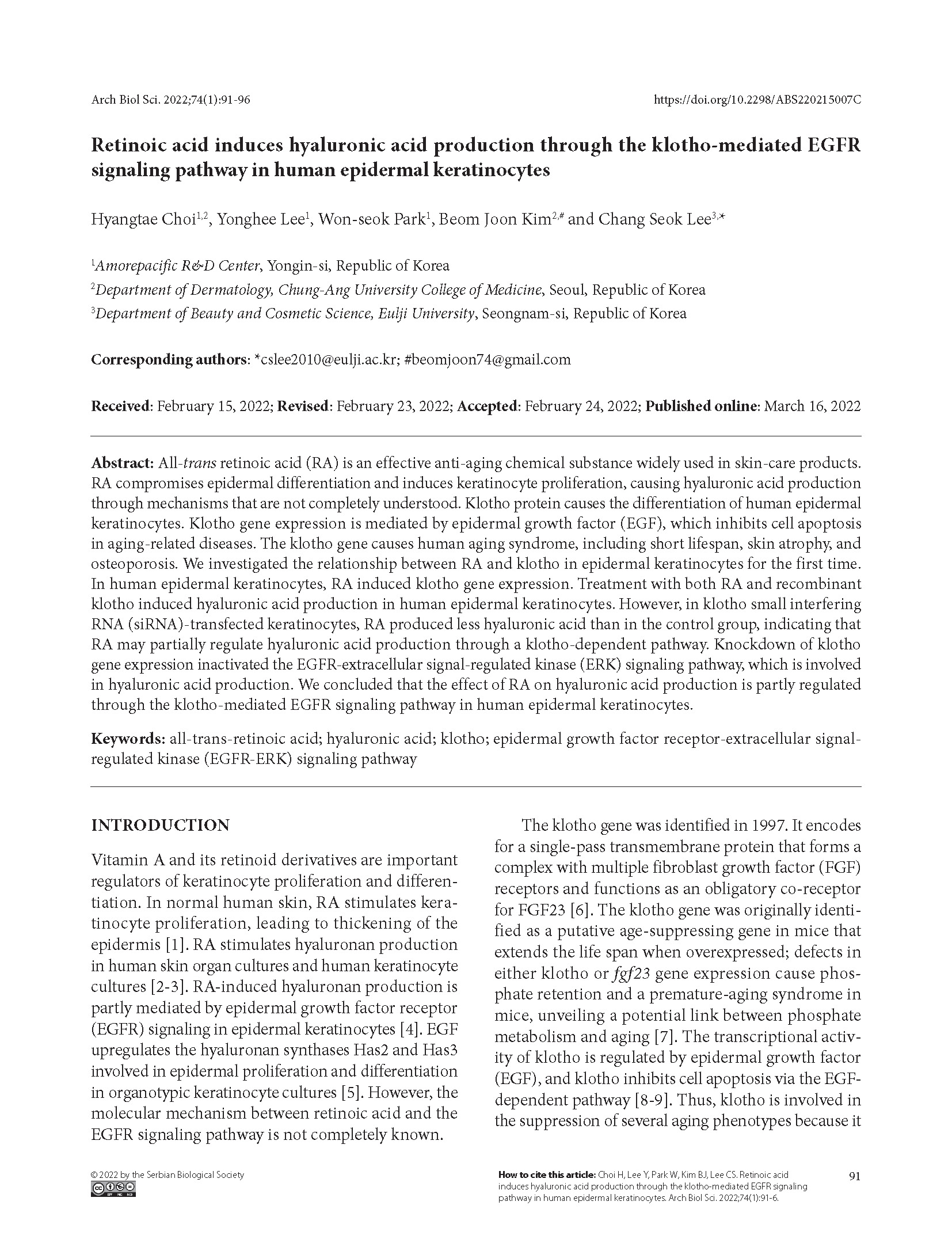Retinoic acid induces hyaluronic acid production through the klotho-mediated EGFR signaling pathway in human epidermal keratinocytes
DOI:
https://doi.org/10.2298/ABS220215007CKeywords:
all-trans-retinoic acid, klotho, hyaluronic acid, epidermal growth factor receptor-extracellular signal-regulated kinase (EGFR-ERK) signaling pathwayAbstract
Paper description:
- The relationship between all-trans retinoic acid (RA) and klotho protein in keratinocytes was examined.
- Klotho small interfering RNA (siRNA)-transfected keratinocytes were used to study the effect of klotho on hyaluronic acid production and the epidermal growth factor receptor (EGFR) activated extracellular-signal regulated kinase (ERK) pathway in RA-treated cells.
- RA induced klotho expression, which mediated hyaluronic acid production through the EGFR-ERK signaling pathway.
- RA behaves as an anti-aging reagent that induces hyaluronic acid production via a klotho-dependent pathway.
Abstract: All-trans retinoic acid (RA) is an effective anti-aging chemical substance widely used in skin-care products. RA compromises epidermal differentiation and induces keratinocyte proliferation, causing hyaluronic acid production through mechanisms that are not completely understood. Klotho protein causes the differentiation of human epidermal keratinocytes. Klotho gene expression is mediated by epidermal growth factor (EGF), which inhibits cell apoptosis in aging-related diseases. The klotho gene causes human aging syndrome, including short lifespan, skin atrophy, and osteoporosis. We investigated the relationship between RA and klotho in epidermal keratinocytes for the first time. In human epidermal keratinocytes, RA induced klotho gene expression. Treatment with both RA and recombinant klotho induced hyaluronic acid production in human epidermal keratinocytes. However, in klotho small interfering RNA (siRNA)-transfected keratinocytes, RA produced less hyaluronic acid than in the control group, indicating that RA may partially regulate hyaluronic acid production through a klotho-dependent pathway. Knockdown of klotho gene expression inactivated the EGFR-extracellular signal-regulated kinase (ERK) signaling pathway, which is involved in hyaluronic acid production. We concluded that the effect of RA on hyaluronic acid production is partly regulated through the klotho-mediated EGFR signaling pathway in human epidermal keratinocytes.
Downloads
References
Fisher GJ, Voorhees JJ. Molecular mechanisms of retinoid actions in the skin. FASEB J. 1996;10(9):1002-13. https://doi.org/10.1096/fasebj.10.9.8801161
Tammi R, Tammi M. Influence of retinoic acid on the ultrastructure and hyaluronic acid synthesis of adult human epidermis in whole skin organ culture. J Cell Physiol. 1986;126(3):389-98. https://doi.org/10.1002/jcp.1041260309
Akiyama H, Saito M, Qiu G, Toida T, Imanari T. Analytical studies on hyaluronic acid synthesis by normal human epidermal keratinocytes cultured in a serum-free medium. Biol Pharm Bull. 1994;17(3):361-4. https://doi.org/10.1248/bpb.17.361
Pasonen-Seppänen SM, Maytin EV, Törrönen KJ, Hyttinen JM, Hascall VC, MacCallum DK, Kultti AH, Jokela TA, Tammi MI, Tammi RH. All-trans retinoic acid-induced hyaluronan production and hyperplasia are partly mediated by EGFR signaling in epidermal keratinocytes. J Invest Dermatol. 2008;128(4):797-807. https://doi.org/10.1038/sj.jid.5701098
Pasonen-Seppänen S, Karvinen S, Törrönen K, Hyttinen JM, Jokela T, Lammi MJ, Tammi MI, Tammi R. EGF upregulates, whereas TGF-beta downregulates, the hyaluronan synthases Has2 and Has3 in organotypic keratinocyte cultures: correlations with epidermal proliferation and differentiation. J Invest Dermatol. 2003;120(6):1038-44. https://doi.org/10.1046/j.1523-1747.2003.12249.x
Kuro-o M, Matsumura Y, Aizawa H, Kawaguchi H, Suga T, Utsugi T, Ohyama Y, Kurabayashi M, Kaname T, Kume E, Iwasaki H, Iida A, Shiraki-Iida T, Nishikawa S, Nagai R, Nabeshima YI. Mutation of the mouse klotho gene leads to a syndrome resembling aging. Nature. 1997;390(6655):45-51. https://doi.org/10.1038/36285
Kuro-o M. Klotho and aging. Biochim Biophys Acta. 2009;1790(10):1049-58. https://doi.org/10.1016/j.bbagen.2009.02.005
Choi BH, Kim CG, Lim Y, Lee YH, Shin SY. Transcriptional activation of the human Klotho gene by epidermal growth factor in HEK293 cells; the role of Egr-1. Gene. 2010;450(1-2):121-7. https://doi.org/10.1016/j.gene.2009.11.004
Ishii M, Yamaguchi Y, Yamamoto H, Hanaoka Y, Ouchi Y. Airspace enlargement with airway cell apoptosis in klotho mice: a model of the aging lung. J Gerontol A Biol Sci Med Sci. 2008;63(12):1289-98. https://doi.org/10.1093/gerona/63.12.1289
Kuro-o M. Klotho and the aging process. Korean J Intern Med. 2011;26(2):113-22. https://doi.org/10.3904/kjim.2011.26.2.113
Nakai K, Yoneda K, Haba R, Kushida Y, Katsuki N, Moriue T, Kosaka H, Kubota Y, Inoue S. Deranged epidermal differentiation in kl/kl mouse and the effects of βKlotho siRNA on the differentiation of HaCaT cells. Exp Dermatol. 2013;22(11):772-4. https://doi.org/10.1111/exd.12258
Kim HJ, Chang H, Han SH, Lee MS, Jung JY, An S, Baek SY, Lee JH, Lee JH, Lee TR, Shin DW, Kim H. Epigallocatechin-3-O-(3-O-methyl)-gallate-induced differentiation of human keratinocytes involves klotho-mediated regulation of protein kinase-cAMP responsive element-binding protein signaling. Int J Mol Sci. 2014;15(4):5749-61. https://doi.org/10.3390/ijms15045749
Zhang B, Xu J, Quan Z, Qian M, Liu W, Zheng W, Yin F, Du J, Zhi Y, Song N. Klotho protein protects human keratinocytes from UVB-induced damage possibly by reducing the expression and nuclear translocation of NF-κB. Med Sci Monit. 2018;24:8583-91. https://doi.org/10.12659/MSM.910687
Niazy MH, Gaber W, Sayed S, Shaker OG, Gheita TA. The anti-aging protein alpha-Klotho in systemic sclerosis patients: does a relationship to telangiectasia exist? Z Rheumatol. 2020;79(4):404-9. https://doi.org/10.1007/s00393-019-00718-w
Kang S, Duell EA, Kim KJ, Voorhees JJ. Liarozole inhibits human epidermal retinoic acid 4-hydroxylase activity and differentially augments human skin responses to retinoic acid and retinol in vivo. J Invest Dermatol. 1996;107(2):183-7. https://doi.org/10.1111/1523-1747.ep12329579
Liu F, Wu S, Ren H, Gu J. Klotho suppresses RIG-I-mediated senescence-associated inflammation. Nat Cell Biol. 2011;13(3):254-62. https://doi.org/10.1038/ncb2167

Downloads
Published
How to Cite
Issue
Section
License
Copyright (c) 2022 Archives of Biological Sciences

This work is licensed under a Creative Commons Attribution-NonCommercial-NoDerivatives 4.0 International License.
Authors grant the journal right of first publication with the work simultaneously licensed under a Creative Commons Attribution 4.0 International License that allows others to share the work with an acknowledgment of the work’s authorship and initial publication in this journal.



